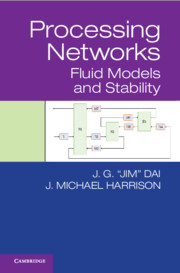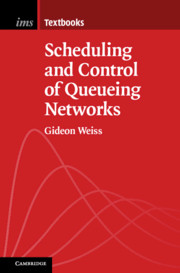Processing Networks
Fluid Models and Stability
$63.99 (C)
- Authors:
- J. G. Dai, The Chinese University of Hong Kong
- J. Michael Harrison, Stanford University, California
- Date Published: November 2020
- availability: In stock
- format: Hardback
- isbn: 9781108488891
$
63.99
(C)
Hardback
Other available formats:
eBook
Looking for an examination copy?
If you are interested in the title for your course we can consider offering an examination copy. To register your interest please contact [email protected] providing details of the course you are teaching.
-
This state-of-the-art account unifies material developed in journal articles over the last 35 years, with two central thrusts: It describes a broad class of system models that the authors call 'stochastic processing networks' (SPNs), which include queueing networks and bandwidth sharing networks as prominent special cases; and in that context it explains and illustrates a method for stability analysis based on fluid models. The central mathematical result is a theorem that can be paraphrased as follows: If the fluid model derived from an SPN is stable, then the SPN itself is stable. Two topics discussed in detail are (a) the derivation of fluid models by means of fluid limit analysis, and (b) stability analysis for fluid models using Lyapunov functions. With regard to applications, there are chapters devoted to max-weight and back-pressure control, proportionally fair resource allocation, data center operations, and flow management in packet networks. Geared toward researchers and graduate students in engineering and applied mathematics, especially in electrical engineering and computer science, this compact text gives readers full command of the methods.
Read more- Thorough explanations and illustrations, including pitfalls, equip readers to use the methods and avoid common errors
- Applications in electrical engineering and computer science showcase the power of fluid-based stability analysis in technologically meaningful settings
- Engaging presentation by two leading figures in the study of stochastic processing networks
Reviews & endorsements
'The deep and rich theory of stochastic processing networks has served as the analytical foundation for the study of communication networks, cloud computing systems, and manufacturing networks. This book by two of the pioneers of the theory presents an authoritative and comprehensive treatment of the topic, and will serve as an important reference to researchers in the area.' R. Srikant, University of Illinois at Urbana-Champaign
See more reviews'A system of interconnected resources can become overloaded and unstable even though each of its individual resources has the capacity to meet the demands on it. This striking observation, first made thirty years ago, has stimulated a major field of research. This book, written by two of the pioneers and leading researchers in the field, is a clear and authoritative account of the state-of-the-art.' Frank Kelly, University of Cambridge
'This book provides an elegant and unified exposition of the general modeling framework of stochastic processing networks (SPNs) and associated theory of stability using fluid models. Much of this material was only previously available in dispersed journal articles. Adopting a continuous-time Markov chain description for SPNs, valid under fairly general assumptions on arrivals, service times and controls, enables a self-contained, accessible treatment. An array of interesting examples and extensions, especially involving applications for telecommunication and data networks, enliven the volume. This monograph will be an invaluable premier resource for graduate students and researchers in computer science, electrical and industrial engineering, applied mathematics and operations management interested in theory and applications of stochastic processing networks.' Ruth J. Williams, University of California, San Diego
Customer reviews
Not yet reviewed
Be the first to review
Review was not posted due to profanity
×Product details
- Date Published: November 2020
- format: Hardback
- isbn: 9781108488891
- length: 404 pages
- dimensions: 234 x 156 x 23 mm
- weight: 0.73kg
- availability: In stock
Table of Contents
1. Introduction
2. Stochastic processing networks
3. Markov representations
4. Extensions and complements
5. Is stability achievable?
6. Fluid limits, fluid equations and positive recurrence
7. Fluid equations that characterize specific policies
8. Proving fluid model stability using Lyapunov functions
9. Max-weight and back-pressure control
10. Proportionally fair resource allocation
11. Task allocation in server farms
12. Multi-hop packet networks
Appendix A. Selected topics in real analysis
Appendix B. Selected topics in probability
Appendix C. Discrete-time Markov chains
Appendix D. Continuous-time Markov chains and phase-type distributions
Appendix E. Markovian arrival processes
Appendix F. Convergent square matrices.
Sorry, this resource is locked
Please register or sign in to request access. If you are having problems accessing these resources please email [email protected]
Register Sign in» Proceed
You are now leaving the Cambridge University Press website. Your eBook purchase and download will be completed by our partner www.ebooks.com. Please see the permission section of the www.ebooks.com catalogue page for details of the print & copy limits on our eBooks.
Continue ×Are you sure you want to delete your account?
This cannot be undone.
Thank you for your feedback which will help us improve our service.
If you requested a response, we will make sure to get back to you shortly.
×







